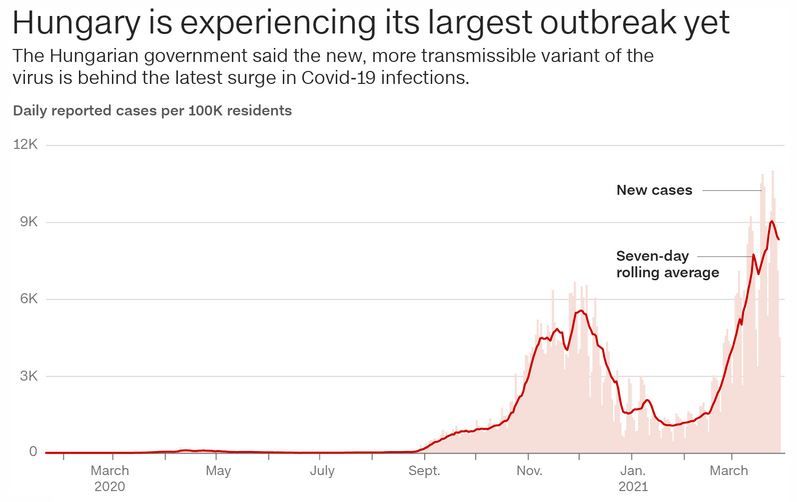Hungary has recorded its deadliest day of the pandemic so far, struggling to contain the latest surge of new coronavirus cases even as its vaccine rollout speeds up.
The government announced Wednesday that 302 people died in a single day, bringing the country's total death toll to 20,737. The government said in a statement that most of those who died had been elderly or chronically ill.
The record toll came just days after Prime Minister Viktor Orban said he had no doubt Hungary would have a "free summer" thanks to the number of vaccine doses it was administering.
The country is well ahead of most other European Union member states when it comes to vaccination rates, trailing only the tiny island nation of Malta.
According to data from the European Centre for Disease Prevention and Control (ECDC), 23.7% of adults in Hungary have received their first dose of the vaccine as of Wednesday, while 8.6% have been fully vaccinated with two doses.
One reason for the speedy rollout is the government's decision to authorize two coronavirus vaccines from Russia and China even though they have not yet been approved by the European Medicines Agency. Hungary became the first EU country to approve Russia's Sputnik V vaccine in January, followed by China's Sinopharm vaccine in February.
That means that while the rest of the EU has been struggling with supply issues as it relies on the BioNTech/Pfizer and AstraZeneca vaccines, Hungary has been using the AstraZeneca as well as the Russian and Chinese vaccines since the last week of February.
Earlier this month, it gave emergency approval to two more vaccines, China's Cansino Biologics Covid-19 shot and CoviShield, the version of the AstraZeneca vaccine made by the Serum Institute of India. It also ordered the Pfizer-BioNTech and Moderna vaccines through the EU, bringing the total number of vaccines it will have at its disposal to seven.
The country's chief medical officer said Wednesday that the Johnson & Johnson vaccine would also become available in the second half of April.
The worst wave yet
But Hungary's relatively successful vaccine rollout has failed to prevent the country from spiraling into a new crisis. The central European nation has seen its worst days both in terms of the number of new cases and deaths in the past week. It has the world's second-highest coronavirus death rate per capita -- 209 deaths per 100,000 people, according to data tracked by CNN. Among countries of any significant size, only the Czech Republic has a higher rate of coronavirus deaths.
Some have expressed concerns about the situation in Hungary's hospitals. Several independent news outlets have written an open letter to the government asking for access to hospitals, Covid ICUs and vaccination centers. Government spokesperson Zoltan Kovacs responded by saying "in hospitals, we should cure patients instead of filming them with cameras." He went on to accuse "left-leaning websites" of "spreading fake news."

Kovacs told CNN the reason for the record number of deaths was the new, more contagious variant of the virus first identified in the United Kingdom, which he said was causing "relatively more hospitalizations and fatalities."
Asked why the country was seeing such a high death rate, he said: "All health care capacities, treatments, medicines etc are available. So it's not the shortage of equipment/personnel."
The country went into lockdown on March 8, closing non-essential stores and shifting schools to remote learning. The closure of stores lasted until March 22, while nurseries and primary schools are due to remain closed until April 7.
Hungary is not the only European country battling to contain the new wave of the pandemic. Others have also struggled, blaming the surge in cases on new mutations.
The B.1.1.7 variant is more contagious, may cause more severe disease and is rapidly infecting younger populations, epidemiologist Michael Osterholm told CNN on Tuesday night. Recent research suggests the strain may also be more deadly. The variant has become the dominant strain of the virus in France, Germany, Italy and the Czech Republic -- and experts are warning the same could soon happen in the United States.















